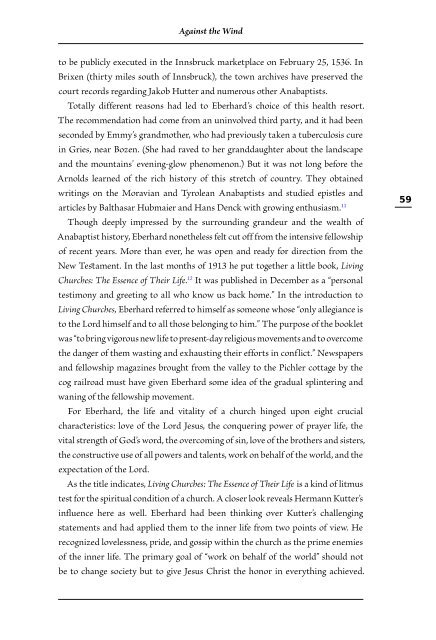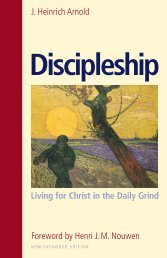Against the Wind: Eberhard Arnold and the Bruderhof - Plough
Against the Wind: Eberhard Arnold and the Bruderhof - Plough
Against the Wind: Eberhard Arnold and the Bruderhof - Plough
Create successful ePaper yourself
Turn your PDF publications into a flip-book with our unique Google optimized e-Paper software.
<strong>Against</strong> <strong>the</strong> <strong>Wind</strong><br />
to be publicly executed in <strong>the</strong> Innsbruck marketplace on February 25, 1536. In<br />
Brixen (thirty miles south of Innsbruck), <strong>the</strong> town archives have preserved <strong>the</strong><br />
court records regarding Jakob Hutter <strong>and</strong> numerous o<strong>the</strong>r Anabaptists.<br />
Totally different reasons had led to <strong>Eberhard</strong>’s choice of this health resort.<br />
The recommendation had come from an uninvolved third party, <strong>and</strong> it had been<br />
seconded by Emmy’s gr<strong>and</strong>mo<strong>the</strong>r, who had previously taken a tuberculosis cure<br />
in Gries, near Bozen. (She had raved to her gr<strong>and</strong>daughter about <strong>the</strong> l<strong>and</strong>scape<br />
<strong>and</strong> <strong>the</strong> mountains’ evening-glow phenomenon.) But it was not long before <strong>the</strong><br />
<strong>Arnold</strong>s learned of <strong>the</strong> rich history of this stretch of country. They obtained<br />
writings on <strong>the</strong> Moravian <strong>and</strong> Tyrolean Anabaptists <strong>and</strong> studied epistles <strong>and</strong><br />
articles by Balthasar Hubmaier <strong>and</strong> Hans Denck with growing enthusiasm. 11<br />
Though deeply impressed by <strong>the</strong> surrounding gr<strong>and</strong>eur <strong>and</strong> <strong>the</strong> wealth of<br />
Anabaptist history, <strong>Eberhard</strong> none<strong>the</strong>less felt cut off from <strong>the</strong> intensive fellowship<br />
of recent years. More than ever, he was open <strong>and</strong> ready for direction from <strong>the</strong><br />
New Tesament. In <strong>the</strong> last months of 1913 he put toge<strong>the</strong>r a little book, Living<br />
Churches: The Essence of Their Life. 12 It was published in December as a “personal<br />
testimony <strong>and</strong> greeting to all who know us back home.” In <strong>the</strong> introduction to<br />
Living Churches, <strong>Eberhard</strong> referred to himself as someone whose “only allegiance is<br />
to <strong>the</strong> Lord himself <strong>and</strong> to all those belonging to him.” The purpose of <strong>the</strong> booklet<br />
was “to bring vigorous new life to present-day religious movements <strong>and</strong> to overcome<br />
<strong>the</strong> danger of <strong>the</strong>m wasting <strong>and</strong> exhausting <strong>the</strong>ir efforts in conflict.” Newspapers<br />
<strong>and</strong> fellowship magazines brought from <strong>the</strong> valley to <strong>the</strong> Pichler cottage by <strong>the</strong><br />
cog railroad must have given <strong>Eberhard</strong> some idea of <strong>the</strong> gradual splintering <strong>and</strong><br />
waning of <strong>the</strong> fellowship movement.<br />
For <strong>Eberhard</strong>, <strong>the</strong> life <strong>and</strong> vitality of a church hinged upon eight crucial<br />
characeristics: love of <strong>the</strong> Lord Jesus, <strong>the</strong> conquering power of prayer life, <strong>the</strong><br />
vital strength of God’s word, <strong>the</strong> overcoming of sin, love of <strong>the</strong> bro<strong>the</strong>rs <strong>and</strong> sisters,<br />
<strong>the</strong> constructive use of all powers <strong>and</strong> talents, work on behalf of <strong>the</strong> world, <strong>and</strong> <strong>the</strong><br />
expectation of <strong>the</strong> Lord.<br />
As <strong>the</strong> title indicates, Living Churches: The Essence of Their Life is a kind of litmus<br />
test for <strong>the</strong> spiritual condition of a church. A closer look reveals Hermann Kutter’s<br />
influence here as well. <strong>Eberhard</strong> had been thinking over Kutter’s challenging<br />
statements <strong>and</strong> had applied <strong>the</strong>m to <strong>the</strong> inner life from two points of view. He<br />
recognized lovelessness, pride, <strong>and</strong> gossip within <strong>the</strong> church as <strong>the</strong> prime enemies<br />
of <strong>the</strong> inner life. The primary goal of “work on behalf of <strong>the</strong> world” should not<br />
be to change society but to give Jesus Christ <strong>the</strong> honor in everything achieved.<br />
59

















